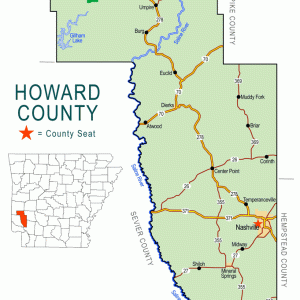calsfoundation@cals.org
Duckett (Howard County)
Duckett, in the Ouachita Mountains in northern Howard County, was never a population center so much as a community defined by geography, relationships, a post office, and a school. The Cossatot River separates it from the rest of Howard County. With its post office and school long closed, the community in the twenty-first century comes together for Duckett Cemetery’s Decoration Day.
Duckett coalesced into a community in the late 1800s. It was named for Allen Turner Duckett (1846–1907), who left Washburn (Sebastian County) with his family in 1876. The post office was created in 1887, around when Duckett first appeared on maps. Most people arrived in Duckett Township after the Civil War; only ten people bought federal land before the Civil War. Between 1876 and 1929, 131 people acquired federal land, mostly through homesteading. The arrival of the Kansas City Southern Railway (KCS) in the late 1890s meant that subsistence farming transitioned to truck and vegetable farming, and land privatization accelerated.
The political township was formed in 1901. Although many Duckett families came from elsewhere in Arkansas, about a quarter of the homesteaders were born in the Great Plains or the Midwest. Likewise, many families living there in 1910 came from states north of Arkansas. Federal land remained available for homesteading well into the 1920s, so newcomers could still acquire inexpensive land even with the KCS nearby.
No African American residents were recorded from the time of the township’s formation in 1901 through the 1950 census, although one Black person (whose name remains unknown) was killed there in 1919, having been lynched after a multi-day chase from De Queen (Sevier County).
Duckett’s de-population began in the 1920s. The post office closed in 1919. Farming no longer required large families, while lumber mills brought wage work nearby. Duckett residents were beginning to rent land instead of owning it. By 1930, a third of all households were renters. After women gained the right to vote, by 1926, a third of Duckett’s election officials were women. Household heads who left Duckett in the first half of the twentieth century generally stayed nearby, although their children were more likely to leave and to go farther away, often by leaving for high school. In 1920, there were eighty households in Duckett, with a total of 372 people; by 1940, there were only twenty-nine households and 120 people.
From about 1899 until school consolidation around 1940, Duckett had a one-room schoolhouse, doubling as a church and community center, which eventually went through the eighth grade. Some sought more education elsewhere. Before 1900, students went to Center Point (Howard County) or Washburn. Later, some took a bus at the Polk County line to the Wickes (Polk County) high school, boarded with Wickes or Mena (Polk County) residents, or went to Magnolia A&M, now Southern Arkansas University (SAU).
Duckett Township’s industry was always agricultural, starting with subsistence farming. The KCS made possible semi-subsistence farming, including cattle, garden truck, some cotton, fruits and vegetables, and lumber. From the 1910s to 1940s, farmers grew blackberries for canning and shipping north. By the twenty-first century, it had become largely cattle, hay, and lumber. Cabin rentals began taking advantage of the tourism industry.
Duckett Cemetery’s first three burials were two of Allen Turner Duckett’s children and his first wife. By 2024, it had 190 documented burials. Decoration Day is the first Sunday in June.
Orval A. Childs Sr. (1910–1998) is the most famous resident. He left Duckett for high school and college at Magnolia A&M. He was a member of the inaugural class of the Arkansas Agriculture Hall of Fame, which recognized him for teaching agriculture at what is now SAU from 1942 to 1976. He regularly returned to the area to recruit Future Farmers of America students for college.
Otsune Tereda Hotovec (1886–1964) was one of four Japanese American Arkansans in 1940, and the only one in the rural Ouachita Mountains. She and her husband established their homestead in Duckett in 1928. During World War II, the Federal Bureau of Investigation (FBI) investigated her for failing to register under the Alien Registration Act of 1940. Despite her 1906 marriage to a U.S. soldier, she was ineligible at the time for citizenship as a native-born Japanese person.
Bessie Mallon Blanton (1890–1982) taught at Duckett school from around 1913 to around 1925. In 1930, she was elected Polk County’s circuit clerk.
For additional information:
Childs, Lisa C. “Forging Community in the Ouachita Foothills of Southwest Arkansas: Duckett Township, Homesteading, Distilling and Race.” MA thesis, University of Arkansas, 2022. Online at https://scholarworks.uark.edu/etd/4782/ (accessed March 5, 2024).
Lisa C. Childs
Fayetteville, Arkansas
 Howard County Map
Howard County Map 




Comments
No comments on this entry yet.